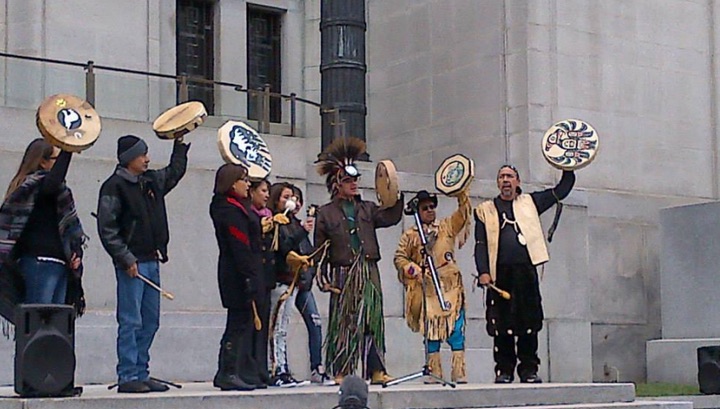Like this article? rabble is reader-supported journalism. Chip in to keep stories like these coming.
In November 2013, the Council of Canadians, along with our Williams Lake chapter, contributed $15,000 to an intervention at the Supreme Court of Canada in support of the legal challenge by the Tsilhqot’in Nation for a broad recognition of title to their territory in British Columbia.
Our entry point for this was our campaign (dating back to October 2008) to stop the Vancouver-based mining company Taseko’s proposed Prosperity project, which would have destroyed Teztan Biny (Fish Lake) on Tsilhqot’in territory under a Schedule 2 exemption to the Fisheries Act.
Just prior to the Court’s ruling in June 2014 that affirmed Tsilhqot’in title, the Vancouver Sun reported:
“It is expected to be the first time the Supreme Court of Canada has ruled on a specific claim to title, or land property rights, and experts say it could be the most important case in the history of Aboriginal rights development in Canada.”
Last weekend, CBC reported:
“At the time, experts predicted that unless First Nations got a greater say in how their traditional territories were being used, B.C. would soon be awash in new protests and new legal cases. Now, two years later, those predictions appear to be coming true.”
The CBC article — which has been shared widely on social media by Naomi Klein and numerous grassroots activists — highlights:
“Fish farms along British Columbia’s West Coast have been at the centre of political and environmental battles for years, but this time it’s a two-year-old legal decision that’s behind the string of recent protests by First Nations against the industry. …Last weekend, the Musgamagw Dzawada’enuxw First Nation served a 72-hour eviction notice on a fish farm at the north end of Vancouver Island. Band leaders cite ancestral rights to the land as the reason for eviction.”
The article also notes that four members of the Ahousat First Nation were arrested this week for entering by boat the Dixon Bay fish farm citing that the farm is on their territory. CBC adds:
“Those involved want to send a very visible message to Ottawa that they don’t want farmed fish on their coast. And those same First Nations also know their demands are now backed by a historic court decision that clearly recognized their legal rights as never before.”
Beyond the June 2014 Tsilhqot’in decision, there is also the Canadian government’s May 2016 endorsement of the United Nations Declaration on the Rights of Indigenous Peoples (UNDRIP).
Given the caution, as Radio Canada has reported, that “such declarations are not legally binding documents,” NDP member of Parliament Romeo Saganash has proposed a private member’s bill that would confirm UNDRIP has a legal application in Canadian law. APTN reports:
“Saganash said passage of his bill, known as Bill C-262 and titled the United Nations Declarations on the Rights of Indigenous Peoples Act, would complete a circle that began in 1984 when he began work on UNDRIP which was adopted by the UN General Assembly in September 2007.”
The Postmedia Network has reported, “In July, Justice Minister Jody Wilson-Raybould said adopting UNDRIP [in Canadian law] was ‘unworkable’ and ‘simplistic.’ Meanwhile, the Liberals won’t back Saganash’s bill to adopt UNDRIP.” To help push the Trudeau government to change its position, University of Winnipeg professor Leah Gazan, a member of Wood Mountain Lakota Nation, travelled across the country to promote the bill. The CBC has reported:
“The university instructor and activist has been meeting with Indigenous and non-Indigenous groups, students, unions, legal experts and religious groups — in Winnipeg, Ottawa and Montreal — trying to drum up support for Bill C-262.”
We will see how the campaign for Bill C-262 unfolds after the House of Commons resumes sitting on September 19, but clearly the Trudeau Liberals promised during the last election that, “It is time for Canada to have a renewed, nation-to-nation relationship with Indigenous Peoples, based on recognition, rights, respect, co-operation, and partnership.”
They failed in that regard in early August when they approved a Navigation Protection Act permit and Fisheries Act permit for the construction of the Site C dam on Treaty 8 territory in northeastern British Columbia. Grand Chief Stewart Phillip has stated:
“Rather than respecting the treaty rights of Prophet River First Nation and West Moberly First Nation and the legal process by pausing or even slowing down site preparation and construction, the Trudeau government, like cowardly, thuggish thieves in the dark, quietly issued federal permits before a long weekend to allow for the acceleration of construction.”
By this December, when the Trudeau has promised to make its decision on the TransMountain pipeline (which is opposed by the Tsleil-Waututh Nation, the Cheam First Nation, and more broadly the Stó:lō collective of First Nations), and by September 2018, the deadline for the federal government to make its decision on the Energy East pipeline (which is opposed by the Wolastoq Nation, Treaty 3, the Association of Manitoba Chiefs, the Kanehsatà:ke Mohawks among other First Nations), we will further know how much (or if at all) the Liberal government respects UNDRIP, the Tsilhqot’in decision, and its campaign promise of a renewed nation-to-nation relationship with Indigenous peoples.
Council of Canadians chairperson Maude Barlow has stated, “We recognize and respect First Nations’ decisions to ban tar sands pipelines and tankers from their territories and we offer our support and solidarity.”
Like this article? rabble is reader-supported journalism. Chip in to keep stories like these coming.



